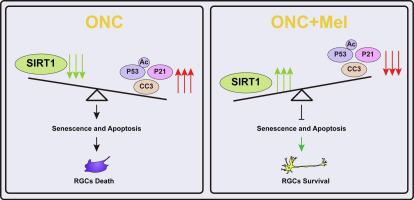当前位置:
X-MOL 学术
›
BBA Mol. Basis Dis.
›
论文详情
Our official English website, www.x-mol.net, welcomes your feedback! (Note: you will need to create a separate account there.)
Melatonin ameliorates retinal ganglion cell senescence and apoptosis in a SIRT1-dependent manner in an optic nerve injury model
Biochimica et Biophysica Acta (BBA) - Molecular Basis of Disease ( IF 6.2 ) Pub Date : 2024-02-05 , DOI: 10.1016/j.bbadis.2024.167053 Yuxun Shi , Dan Ye , Kaixuan Cui , Xue Bai , Matthew Fan , Yanlin Feng , Chenyang Hu , Yue Xu , Jingjing Huang
Biochimica et Biophysica Acta (BBA) - Molecular Basis of Disease ( IF 6.2 ) Pub Date : 2024-02-05 , DOI: 10.1016/j.bbadis.2024.167053 Yuxun Shi , Dan Ye , Kaixuan Cui , Xue Bai , Matthew Fan , Yanlin Feng , Chenyang Hu , Yue Xu , Jingjing Huang

|
Melatonin is involved in exerting protective effects in aged-related and neurodegenerative diseases through a silent information regulator type 1 (SIRT1)-dependent pathway. However, little was known about the impact of melatonin on retinal ganglion cell (RGC) senescence and apoptosis following optic nerve crush (ONC). Thus, this study aimed to examine the effects of melatonin on RGC senescence and apoptosis after ONC and investigate the involvement of SIRT1 in this process. To study this, an ONC model was established. EX-527, an inhibitor of SIRT1, was injected intraperitoneally into mice. And melatonin was administrated abdominally into mice after ONC every day. Hematoxylin & eosin staining, retina flat-mounts and optical coherence tomography were used to evaluate the loss of retina cells/neurons. Pattern electroretinogram (p-ERG) was performed to evaluate the function of RGCs. Immunofluorescence and western blot were used to evaluate protein expression. SA-β-gal staining was employed to detect senescent cells. The results demonstrated that melatonin partially rescued the expression of SIRT1 in RGC 3 days after ONC. Additionally, melatonin administration partly rescued the decreased RGC number and ganglion cell complex thickness observed 14 days after ONC. Melatonin also suppressed ONC-induced senescence and apoptosis index. Furthermore, p-ERG showed that melatonin improved the amplitude of P50, N95 and N95/P50 following ONC. Importantly, the protective effects of melatonin were reversed when EX-527 was administered. In summary, this study revealed that melatonin attenuated RGC senescence and apoptosis through a SIRT1-dependent pathway after ONC. These findings provide valuable insights for the treatment of RGC senescence and apoptosis.
中文翻译:

褪黑素在视神经损伤模型中以 SIRT1 依赖性方式改善视网膜神经节细胞衰老和凋亡
褪黑激素通过 1 型沉默信息调节因子 (SIRT1) 依赖性途径对老年相关疾病和神经退行性疾病发挥保护作用。然而,人们对褪黑激素对视神经挤压(ONC)后视网膜神经节细胞(RGC)衰老和凋亡的影响知之甚少。因此,本研究旨在探讨褪黑激素对ONC后RGC衰老和凋亡的影响,并探讨SIRT1在此过程中的参与情况。为了研究这个问题,建立了ONC模型。EX-527 是一种 SIRT1 抑制剂,被注射到小鼠腹腔内。ONC后每天给小鼠腹腔注射褪黑激素。使用苏木精和伊红染色、视网膜平片和光学相干断层扫描来评估视网膜细胞/神经元的损失。进行图形视网膜电图(p-ERG)来评估 RGC 的功能。使用免疫荧光和蛋白质印迹来评估蛋白质表达。SA-β-gal染色用于检测衰老细胞。结果表明,ONC 后 3 天,褪黑激素部分挽救了 RGC 中 SIRT1 的表达。此外,服用褪黑激素可以部分缓解 ONC 后 14 天观察到的 RGC 数量和神经节细胞复合体厚度的减少。褪黑素还抑制 ONC 诱导的衰老和细胞凋亡指数。此外,p-ERG 显示,ONC 后褪黑激素改善了 P50、N95 和 N95/P50 的幅度。重要的是,服用 EX-527 后,褪黑激素的保护作用被逆转。总之,这项研究揭示了 ONC 后褪黑激素通过 SIRT1 依赖性途径减轻 RGC 衰老和凋亡。这些发现为 RGC 衰老和细胞凋亡的治疗提供了宝贵的见解。
更新日期:2024-02-05
中文翻译:

褪黑素在视神经损伤模型中以 SIRT1 依赖性方式改善视网膜神经节细胞衰老和凋亡
褪黑激素通过 1 型沉默信息调节因子 (SIRT1) 依赖性途径对老年相关疾病和神经退行性疾病发挥保护作用。然而,人们对褪黑激素对视神经挤压(ONC)后视网膜神经节细胞(RGC)衰老和凋亡的影响知之甚少。因此,本研究旨在探讨褪黑激素对ONC后RGC衰老和凋亡的影响,并探讨SIRT1在此过程中的参与情况。为了研究这个问题,建立了ONC模型。EX-527 是一种 SIRT1 抑制剂,被注射到小鼠腹腔内。ONC后每天给小鼠腹腔注射褪黑激素。使用苏木精和伊红染色、视网膜平片和光学相干断层扫描来评估视网膜细胞/神经元的损失。进行图形视网膜电图(p-ERG)来评估 RGC 的功能。使用免疫荧光和蛋白质印迹来评估蛋白质表达。SA-β-gal染色用于检测衰老细胞。结果表明,ONC 后 3 天,褪黑激素部分挽救了 RGC 中 SIRT1 的表达。此外,服用褪黑激素可以部分缓解 ONC 后 14 天观察到的 RGC 数量和神经节细胞复合体厚度的减少。褪黑素还抑制 ONC 诱导的衰老和细胞凋亡指数。此外,p-ERG 显示,ONC 后褪黑激素改善了 P50、N95 和 N95/P50 的幅度。重要的是,服用 EX-527 后,褪黑激素的保护作用被逆转。总之,这项研究揭示了 ONC 后褪黑激素通过 SIRT1 依赖性途径减轻 RGC 衰老和凋亡。这些发现为 RGC 衰老和细胞凋亡的治疗提供了宝贵的见解。



























 京公网安备 11010802027423号
京公网安备 11010802027423号